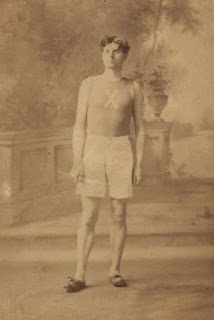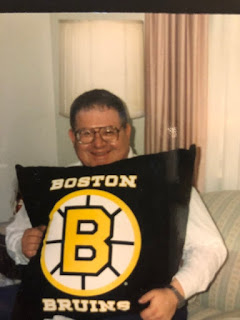Dr. Ronald J. MacDonald Marathoner – World Record Holder – Physician
Ronald J. MacDonald was born on September 19, 1874 in Frasers
Grant, Antigonish County, NS, the son of Lauchlin “Drover” and Elizabeth
MacDonald. Lauchlin earned the nickname “Drover” by driving cattle and
transporting them via schooner to Newfoundland, during which he would supervise
the trip., On one such occasion in 1888, the schooner Mary Ellen was lost
during a vicious storm, and all hands were lost. Elizabeth MacDonald, with five
children in tow, moved to Massachusetts after her husband’s death.
Ronald MacDonald was 14 years old at that time of the family’s move to Massachusetts. Eventually, he became a linesman with the New England Telephone and Telegraph Company. On his time off, he began running at a local gym. It seems he was a natural. An interesting story circulated around Antigonish during his summer visits to his old home. There, he got plenty of experience running after the cattle on the family farm. People would remark, “What a great doctor he will be. He would just grab his bad and set off on the run. He would be hallway there before a horse could be hitched up.”
Ronnie certainly had a gift. When he was 18 years old and
still living in Boston, he ran against an American runner who held the United
States mile record. Ronnie beat him.
After that race, Ronnie began to train seriously, both on the
track and in the gym. In 1897, at the age of 23, he won the seven mile United
States Cross Country Championship. In 1898, he set a new World Record for the
eleven mile cross country race. He then set his sights on the Boston Marathon.
At that time, the Boston marathon was in an embryonic stage.
The story of the Greeks defeating the Persians at Marathon in 490 BC and the legendary
40 km trek made by Philippides had inspired the inclusion of a marathon in the
first modern Olympic Games in Athens in 1896, and people Boston became
interested in establishing a tradition there.
With a new World Record to his credit, Ronnie MacDonald
signed up for the second running of the Boston Marathon in 1898. During the race,
he was behind eight runners by 2.5 miles, with 10 miles left in the race. He
surged past all eight of them and won the race, shaving 13 minutes off the
first marathon time, a new World Record. The Boston Globe proclaimed Ronnie to
be “The champion Marathon Road Racer of the world.”
In the Antigonish Highland Games of 1899, MacDonald ran a two
mile exhibition run, in which he ran against a fresh runner every quarter of a
mile, or 440 yards. The poster advertising the event proclaimed, “All patriotic
Nova Scotians would avail themselves of the only change of witnessing the
performance of the world's strongest and fastest runner.” Not surprisingly,
Ronnie won, fresh runners notwithstanding.
In the fall of 1899, Ronnie enrolled in pre-medical studies
at Boston College, though he continued to run. In 1900, he once again signed up
for the Boston Marathon, but there would be no first-place finish for him this
time around. At that time, betting on races was permitted, and large amounts of
money would sometimes change hands. Ronnie was running very well until a
passerby handed him a sponge to help him cool off and rehydrate. Though he was
leading the race, he eventually had to stop, and was unable to finish the race.
It turned out that the sponge was laced with chloroform. Betting can make
people to terrible things.
That same year, MacDonald was selected as a member of the US
Team for the Paris Olympics. He therefore became the first Nova Scotian ever to
compete in the Olympic Games. On a blistering hot day, he was comfortably in
the lead near the finish line when he stumbled across four French racers,
looking fresh as daisies. Apparently some patriotic Parisian taxi driver had
picked them up and drove through the back streets before dropping them off near
the finishing line. Once again, MacDonald was beaten by monsters; betting had
robbed him of his victory.
 In 1901, Ronnie returned to Antigonish and continued his
pre-med studies at St. FX College. In the summer of 1902, he set a Canadian
record in the five mile race at the Antigonish Highland Games. In the next two
years, he broke the Canadian two and five miles records, and set a new World
Record for the mile run.
In 1901, Ronnie returned to Antigonish and continued his
pre-med studies at St. FX College. In the summer of 1902, he set a Canadian
record in the five mile race at the Antigonish Highland Games. In the next two
years, he broke the Canadian two and five miles records, and set a new World
Record for the mile run.
Ronald J. MacDonald graduated from StFX in 1907 and was
accepted to Tufts University in Boston. He did postgraduate work at Harvard and
became a Physician, before moving to Newfoundland to become a rural doctor in
St. Georges. He practiced there for 27 years.
Always a Nova Scotian at heart, MacDonald returned every summer to Antigonish and competed in the Highland Games. In 1938, he finally came home, establishing a practice in Heatherton. His last public appearance was as a starter at the track meet at the Highland Games.
Once proclaimed the
champion road racer of the world, MacDonald died on September 3, 1947. He is
buried in the Immaculate Conception cemetery in Heatherton.
Submitted by Bill Kiely



Comments
Post a Comment